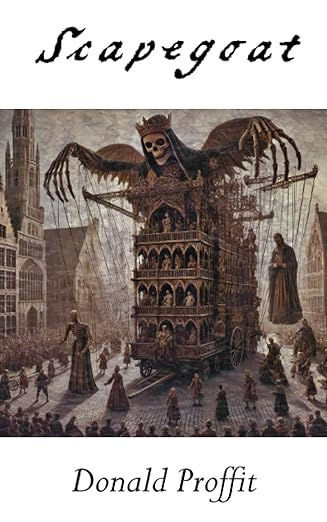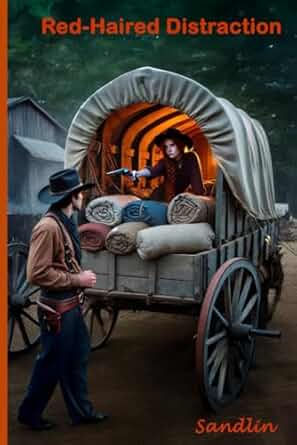A Story of Courage in the Face of Tyranny - an Editorial Review of "Scapegoat"
- DK Marley
- Aug 1, 2025
- 5 min read

Book Blurb:
Bruges, 1558—a city of faith and ferocity, grandeur and terror, where whispers can turn to accusations, and justice serves power above truth. When young Matthias arrives in Bruges, he is drawn into the orbit of François van Daele and Willem de Clerc, two men living quietly in the shadows—until a jealous rival brands them as sinners. Dragged into a society ravenous for vengeance, they face sentences of unspeakable cruelty—caught in a corrupt inquisition where innocence is condemned, and guilt walks free. As the grip of authority tightens, loyalties fray, truths are twisted into confessions, and the city itself turns predator, hunting those who dare resist its will. Yet even in Bruges’ darkest corners, songs are sung, stories endure, and redemption may still be found—for those willing to pay its price. Guided by Knowledge, a towering puppet from the morality play The Summoning of Everyman, François must confront a world gone mad and search for truth within its lies. Inspired by actual events, Scapegoat is a searing tale of power, persecution, and the enduring strength of human bonds. Rich in historical detail and haunting allegory, it is a story of courage in the face of tyranny—and the hope that even in the darkest times, truth, love, and the loyalty of a true friend may find a way.
Book Buy Link: https://geni.us/BplEHL
Author Bio:

Donald Proffit, a visionary in the creative arts, a former arts educator, and school principal, has been short-listed for the 2024 William Saroyan International Writing Prize in nonfiction for his memoir, Hardship Alaska. With a background in music, dance, and visual arts, Donald has presented workshops and original performances worldwide, including in Israel, where his work helped foster dialogue among Israeli, Palestinian, and American youth. His accolades include a John F. Kennedy Center for the Performing Arts Teacher Fellowship and the D. Bennett Mazur Award for Lifetime Achievement from the Personal Liberty Fund of the New Jersey Lesbian and Gay Coalition.
Editorial Review:
“Scapegoat” by Donald Proffit is a vivid, haunting, and masterfully structured historical novel that delves deep into the psychology of persecution, social conformity, and forbidden love. Through an intricate weaving of fictional storytelling and historical grounding, Proffit revisits 16th-century Bruges, a city suffocating under religious orthodoxy and fear and resurrects a forgotten injustice through prose that is as poetic as it is precise. The novel is Intricately framed by the fictional ballad of Joos van den Rijm, a rogue minstrel whose voice opens and closes the tale like a theatrical curtain, setting the tone for a narrative steeped in irony, sorrow, and remembrance.
The novel opens in a smoky tavern, where van den Rijm, a sharp-tongued balladeer with more wit than caution, plucks his lute and grins through the opening lines of ‘The Ballad of the Scapegoat.' He’s our guide and our provocateur, inviting us into a story that is both elegy and accusation. “What is history if not a song retold until it pleases the powerful?” This line introduces the central theme of history as manipulation, far away from the truth, retold until it pleases the powerful. The structure of the novel alternates between van den Rijm’s retrospective ballad and the unfolding events of 1558, a technique that creates both immediacy and reflection and through this dual frame, Proffit explores how memory is preserved, not in court records, but in whispers, songs, and scars.
“The North Sea sky hung over Bruges, shifting in shades and moods with the ever-present wind… The journeyman was captivated by this place—hauntingly beautiful and heartbreakingly adrift—a city losing its grip on its golden age… a place of contradictions: beautiful and crumbling, proud yet steeped in desperation.”
Here, Proffit’s deft command of setting and mood is shown and Bruges becomes more than a backdrop. It is skillfully portrayed as a character in its own right, with poetic and melancholy prose that precisely captures the atmosphere with painterly perfection.
The novel's heart beats strongest in its exploration of persecution. François and Willem are young men who fall victim to the era’s draconian laws against “sodomy,” a term that, in Proffit’s hands, is shown as both a legal cudgel and a cultural neurosis. The power of this story lies not in a dramatic reveal or courtroom theatrics, but in the slow, smothering inevitability of doom and their love, depicted with tenderness and restraint, is made all the more heartbreaking by the quiet spaces in which it’s allowed to breathe.
“The contact lasted only a heartbeat—no more. But it carried an unspoken promise: I’m here. I won’t leave you to face this alone… François couldn’t help but notice how [Canon] van der Velde’s shadow stretched across the square… a reminder that his reach, like that of the grotesque figures, could fall over anyone it touched.”
This moment exemplifies Proffit’s subtle yet devastating style- he doesn’t overstate the threat but rather he lets it loom like the carved giants in the play, like the cloisters and alleyways of Bruges. Canon Henric van der Velde is a chilling antagonist, a man who uses religion as both shield and sword. His dialogue is silken but edged with menace, and his presence in scenes feels like a tightening noose. Most importantly, he wonderfully imbues every character with complexity and motive, no matter how little.
Proffit’s narrative craftsmanship is particularly evident in the festival sequence. As the crowd views the reliquary of Christ’s blood, Matthias, a newcomer and witness to the unfolding events, notes:
“The crowd’s energy reached a fever pitch… a keening sound rose from somewhere within—a lone voice, then a harmony of cries… not a cheer but a sound older than language… an untamed wilderness hidden behind Bruges’ orderly façade.”
Here, the author's style borders on the mythic. Through a cascade of sensory detail he cleavery peels back the veneer of civilization to reveal the primal forces beneath. Religion, nationalism, and spectacle merge into a shared trance, and one understands how scapegoating becomes not just possible but inevitable. This extract also demonstrates Proffit skill at building suspense through imagery and rhythm while reflecting the novel’s deeper themes of collective psychology and cultural amnesia.
Structurally, “Scapegoat” is elegant and deliberate and flows like a liturgy, with epigraphs from a fictional ballad at the start of each chapter serving as poetic anchors. Readers will love how these verses echo and foreshadow, giving the prose a musical resonance that elevates it beyond standard historical fiction. The pacing is immersive rather than propulsive; Proffit invites the reader to linger, to absorb, to mourn.
The book’s intended audience is likely lovers of literary historical fiction—readers who appreciate atmosphere, psychological depth, and a narrative that refuses easy answers. It is a novel that merits considerable study and revisiting. With “Scapegoat,” Donald Proffit has created not just a haunting critique of moral frenzy, but also a meditation on memory, desire, and survival. It is a beautiful offering that sings, mourns, and refuses to be forgotten.
To have your historical novel editorially reviewed and/or enter the HFC Book of the Year contest, please visit www.thehistoricalfictioncompany.com/book-awards/award-submission
















Progression in Drift Boss isn’t just about surviving longer—it’s about earning coins that unlock rewards. Every session contributes to your journey, even if you crash early. Coins let you collect new cars, buy upgrades, and explore fresh possibilities.